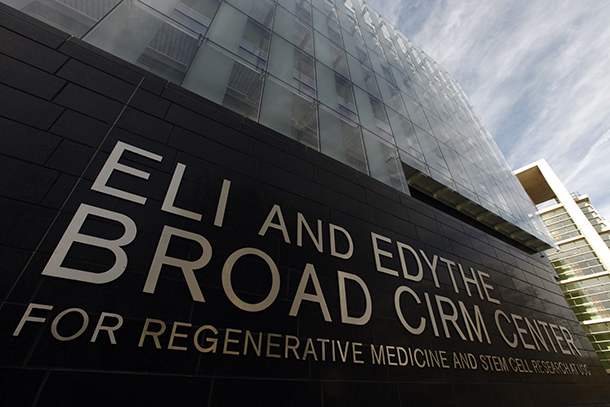The price of progress is not only the energy and talent of stem cell scientists, but also the research dollars that support their discoveries. In recent months, faculty members have secured numerous grants to support stem cell-based approaches to study and treat illnesses ranging from osteoarthritis to Alzheimer’s disease to cystic fibrosis.
Here are a few of the newly funded projects from USC’s stem cell research center and department at the Keck School of Medicine of USC.
- Andy McMahon, PhD, W.M. Keck Provost Professor of Stem Cell Biology and Regenerative Medicine and Biological Sciences; chair of stem cell biology and regenerative medicine; and director, Eli and Edythe Broad Center for Regenerative Medicine and Stem Cell Research at USC, is comparing the gene activity in mouse and human kidney stem cells and tissues with the (Re)Building a Kidney consortium, funded by a $231,000 grant from the National Institute of Diabetes and Digestive and Kidney Diseases.
- Michael Bonaguidi, PhD, assistant professor of stem cell biology and regenerative medicine, is developing new tools for stem cell precision medicine, with support from a $50,000 pilot grant from the L.K. Whittier Foundation.
- Gage Crump, PhD, associate professor of stem cell biology and regenerative medicine; Rob Maxson, PhD, professor of biochemistry and molecular medicine; and Yang Chai, DDS, PhD, professor and associate dean of research in the Herman Ostrow School of Dentistry of USC, are using zebrafish and mice to understand why the skull bones prematurely fuse and impact brain growth in a condition known as craniosynostosis, with support from a $3.3 million grant from the National Institute of Dental and Craniofacial Research.
- Justin Ichida, PhD, assistant professor of stem cell biology and regenerative medicine, is studying how genetic mutations affecting a type of immune cell, known as microglia, might increase the risk for developing Alzheimer’s disease, supported by $100,000 from the John Douglas French Alzheimer’s Foundation. He also is researching amyotrophic lateral sclerosis (ALS) and frontotemporal dementia with a $1.7 million grant from the National Institute of Neurological Disorders and Stroke, as well other neurological diseases with $1.3 million of support from DRVision Technologies.
- Rong Lu, PhD, assistant professor of stem cell biology and regenerative medicine, is studying how aging affects hematopoietic or blood-forming stem cells, thanks to a $2.1 million grant from the National Heart, Lung, and Blood Institute. She is also teaming up with Qi-Long Ying, MD, PhD, associate professor of stem cell biology and regenerative medicine, to expand and characterize the population of progenitor cells that sustain part of the immune system, with a $50,000 pilot grant from the L.K. Whittier Foundation.
- Wange Lu, PhD, associate professor of stem cell biology and regenerative medicine, is a co-principal investigator with Rose Lai, MD, clinical associate professor of neurology (part-time) on a $709,000 National Cancer Institute grant to study the genes associated with a type of brain tumor known as glioma. He also is working with researchers at the University of Virginia to study colorectal cancer, with $992,000 from the National Cancer Institute.
- Francesca Mariani, PhD, assistant professor of cell and neurobiology, and Crump are examining the role of cartilage in healing large-scale bone injuries, supported by a $2.4 million Research Project Grant from the National Institute of Arthritis and Musculoskeletal and Skin Diseases.
- Leonardo Morsut, PhD, assistant professor of stem cell biology and regenerative medicine, is developing a synthetic technology for controlling stem cell behavior for regenerative medicine applications, thanks to a $1 million grant from the National Institute of Biomedical Imaging and Bioengineering.
- Joseph T. Rodgers, PhD, assistant professor of stem cell biology and regenerative medicine, is investigating how healing becomes impaired during aging, with support from a $100,000 grant from the American Federation for Aging Research (AFAR).
- Neil Segil, PhD, professor of research stem cell biology and regenerative medicine, is exploring the mechanisms controlling the activity of genes involved in the development of the inner ear, with support from the Hearing Health Foundation.
- Paula Cannon, PhD, professor of molecular microbiology and immunology, is looking at the conditions under which hematopoietic or blood-forming stem cells can give rise to the brain’s microglia, which are susceptible to HIV infection, and developing new treatment strategies, thanks to a $3.3 million dollar Research Project Grant from the National Institute of Mental Health.
- Chai and a multi-institutional research team, called C-DOCTOR (Center for Dental, Oral and Craniofacial Tissue and Organ Regeneration), are one step closer to developing products that facilitate tissue regeneration, thanks to a $12 million grant from the National Institute of Dental and Craniofacial Research.
- Denis Evseenko, MD, PhD, associate professor of orthopaedic surgery, is using stem cells to regenerate cartilage as a treatment for osteoarthritis, with support from a $2.5 million grant from the California Institute for Regenerative Medicine (CIRM).
- Amy Firth, PhD, assistant professor of medicine, is using gene-edited stem cells to study rare mutations in cystic fibrosis, thanks to a $63,000 Cystic Fibrosis Million Dollar Bike Ride pilot grant from the Penn Orphan Disease Center.
- Senta Georgia, PhD, assistant professor of pediatrics, is investigating new stem cell-based treatments for children with a genetic form of diabetes and malabsorptive diarrhea called enteric anendocrinosis, funded by a $180,000 grant from the California Institute for Regenerative Medicine (CIRM).
- Megan McCain, PhD, assistant professor of biomedical engineering in the USC Viterbi School of Engineering, is creating a new model for studying Duchenne muscular dystrophy, supported by a $75,000 grant from the Rose Hills Foundation.
— Cristy Lytal


